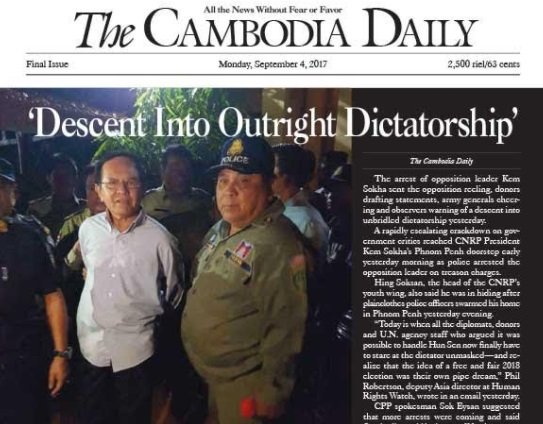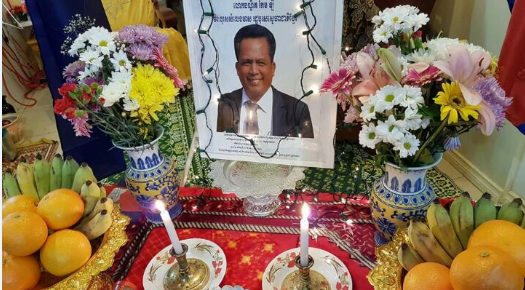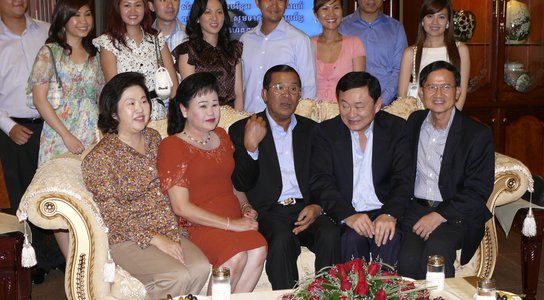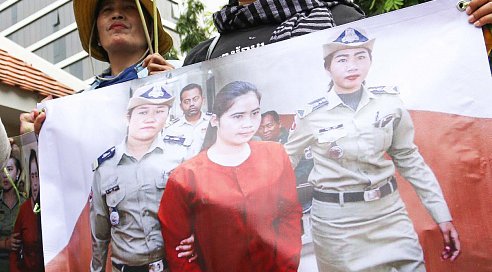Cambodian newsstands yesterday were emblazoned with the headline “Descent into outright dictatorship” – an apt parting shot for the Cambodia Daily, a paper whose motto was ‘all the news, without fear or favour’.
This was the last ever edition of the Daily - one of just a handful of media outlets in Cambodia not under government control. It folded soon after being handed a US $6.3 million tax bill the paper said was politically motivated. The lead story on its last day in circulation was the arrest a day earlier of opposition leader Kem Sokha, on charges of treason.
Both acts are related, and both are deeply concerning.
These are the latest tactics in a sweeping attack on voices that are critical of Cambodia’s prime minister Hun Sen and his allies. They deal a heavy blow to efforts to tackle the systemic corruption that has helped the ruling party clutch on to power for so long.
Meanwhile Cambodia’s position in global geopolitics is shifting, and it may now be down to the business community, not governments, to halt the regime’s onward march of authoritarianism.
Pre-emptive strike
With more than 30 years under his belt, Hun Sen is Asia’s longest-serving premier, but is facing a major challenge to his supremacy as the country prepares to cast its vote in next year’s elections.

The front cover of the Cambodia Daily's final issue shows the arrest of opposition leader Kem Sokha, who has been charged with treason
Since the opposition made important gains in June’s local elections, the government has upped a gear in its pre-emptive strike ahead of the parliamentary polls next summer. Dozens of independent radio shows have been taken off-air. Staff at the US-affiliated National Democratic Institute were given a week to pack up their things and leave the country. Changes to the Law on Political Parties now give the government and courts the power to shut down whole parties.
This past year has also seen the murder in broad daylight of a popular political commentator, and the jailing of Facebook users for threatening or defamatory posts. Strong doubts have been voiced about the adequacy of the investigation into Kem Ley’s death, and the opposition claims it was a political assassination.
These developments have had a chilling effect, with citizens scared to speak out.
Over the years the Cambodia Daily has been an important partner for Global Witness, as well as a key source of information. The paper reported on our Hostile Takeover investigation, which found that Hun Sen’s family members are pulling the strings on Cambodia’s economy and amassing vast personal fortunes, with extreme consequences for the population.
Likewise, the Daily helped spread the word when we found that corrupt politicians in Cambodia were orchestrating a land grabbing crisis which was devastating local livelihoods and the environment.
Buying power
Without critical and non-partisan reporting, the Cambodian public will be disproportionately exposed to media that is thinly veiled government propaganda. Cambodia’s diplomatic, trade and investment partners will also be in the dark about what’s really going on there.
Western governments are all too aware of this. Diplomats in the US, the EU, the UN and several other countries have stepped up this week to denounce the government’s crackdown.
But at a time when Cambodia is less dependent on foreign aid and increasingly cosying up to China, their influence is fast waning.
The government’s real achilles heel lies in trade and investment. The country has risen from the ashes of the Khmer Rouge genocide that killed 1.7 million in the 1970s to become one of the world’s fastest growing economies. With significant support from Western donors, its economy has expanded at a rate of around 7% a year for the past twenty.
Donor support has ebbed significantly in recent years, however – now foreign companies and investors are turning the cogs of Cambodia’s economic development.
According to Cambodian government data, in 2015 the UK was the second largest foreign investor in Cambodia after China. Last year it was Japan. The US is Cambodia’s biggest trading partner, importing over US $2 billion worth of goods last year.
The prime minister’s friends and family are major beneficiaries. Our Hostile Takeover investigation showed how Hun family members wield significant control across most of Cambodia's lucrative industries, with links to major international brands including Apple, Nokia, Visa, Procter & Gamble, Nestlé and Honda.
If these financial relationships were in jeopardy, Cambodia’s ruling party might be less dismissive of the views of the international community. As the country continues its descent into dictatorship, its business partners might want to reconsider what they are bankrolling.


